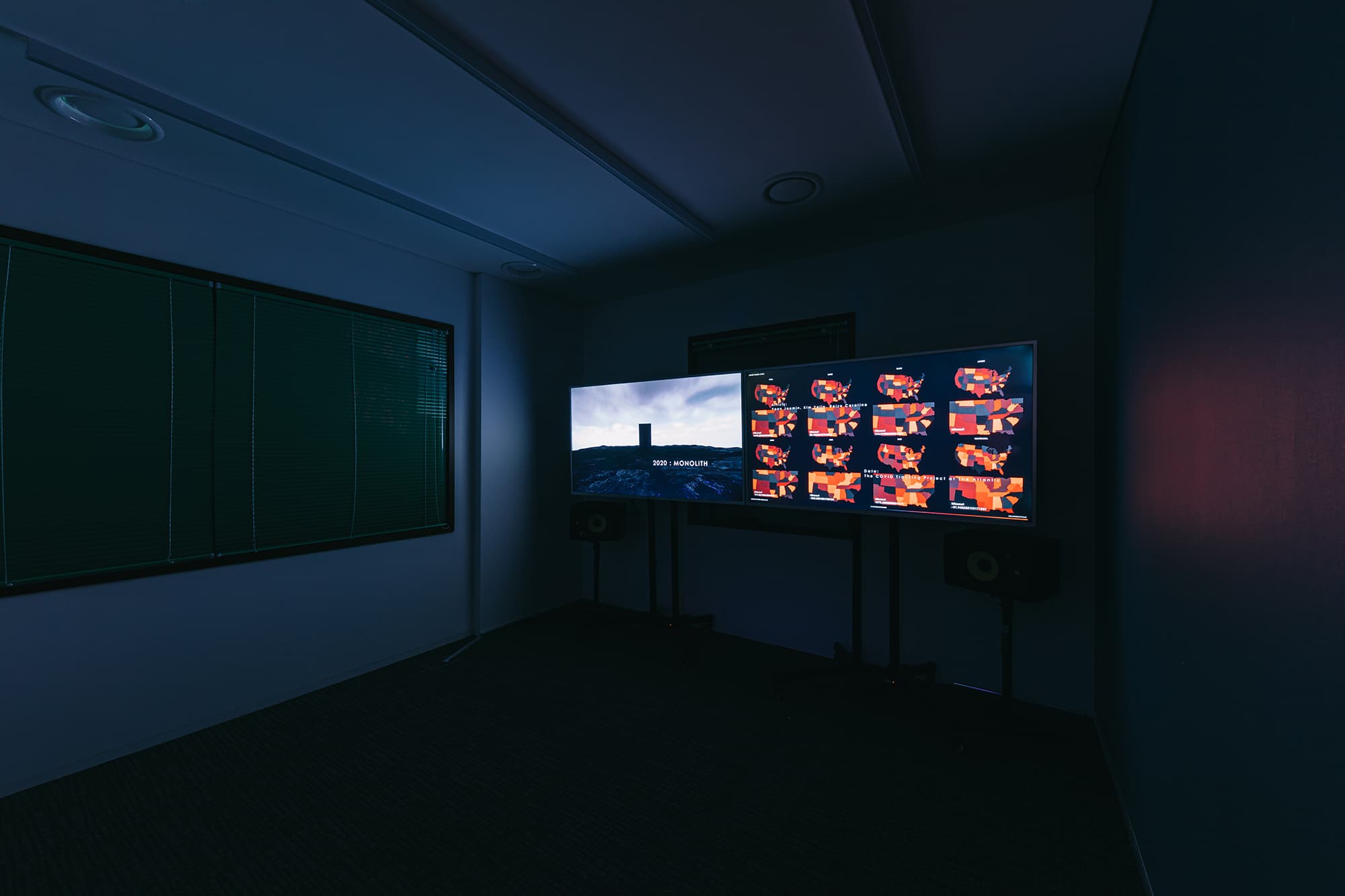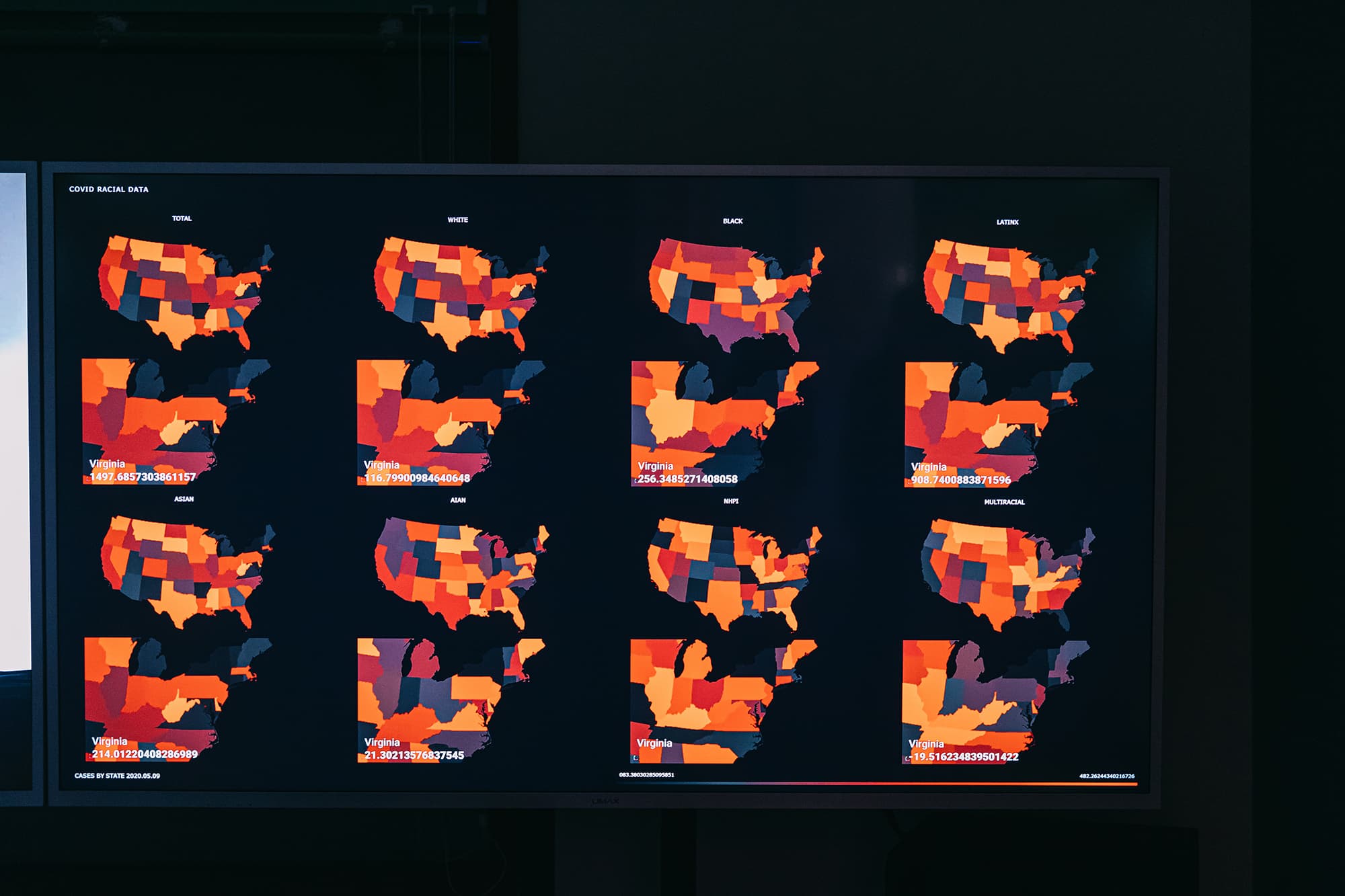Q. Please explain the <2020: MONOLITH> project.
Jae-min Yoon (Creator): We are trying to make a video about the human characteristics that allow us to overcome this COVID-19 pandemic. We are thinking about the attitudes that are needed for humans during not just this pandemic but during major crises like economic crises and wars.
Q. So a disaster or crises we might face is the big narrative of this project.
Ye-jin Kim (Creator): I think we tend to put more emphasis on this COVID-19 pandemic because we are trying to find a better way for our audience to relate. We are trying to visualize the data on social problems like inequality which are happening during this pandemic, as objectively as we can but also send messages that can comfort people and give hope.
Q. What kind of data are you trying to visualize?
Ye-jin Kim (Creator): Various data related to this pandemic. But not only that, we collect and visualize data which can provide positive, comforting and hopeful messages to people. We use engineering technologies to collect and interpret the data but we use artistic methods to edit them.
Jae-min Yoon (Creator): There are various related to COVID-19 and situations before the pandemic. For instance, information on air travel or the stock markets. We’re looking at how these pieces of information have changed because of the pandemic. We can also look at the groups being neglected and disadvantaged in the contactless environment. By looking at the data of the situations prior to the pandemic, we’ll be able to get some ideas on how to overcome this pandemic. The audience will look at the visualized comparative analysis data and have an opportunity to ask themselves what kind of humanitarian attitude we need in these times.
Caro (Creator): We can also look at changes in the number of confirmed cases by each country. This data can show us the impact of the pandemic on our societies. This data includes not just numbers but interviews and people’s reactions from all over the world.
Q. What’s the story you use to convey your messages through this project?
Ye-jin Kim (Creator): We’re thinking of something that can interactively connect the audience with our data. It could be racial issues or other issues related to socioeconomic system. We could include some content about how the higher your socioeconomic status, the less your life will be impacted by a disaster and the lower your socioeconomic status, the more your life will be impacted by a disaster. I think something like this can make the audience intuitively see that everyone is impacted differently and the range of changes people go through is different for person to person in this pandemic.
Q. But showing how people are impacted differently in this pandemic can be a bit offensive to certain groups.
Ye-jin Kim (Creator): And that’s what we want to happen. The greater the shock, the greater the effect. Also, we have to see the facts to discuss how we are going to live in the future. It’s also a fact that issues like social inequalities were more likely to be solve when they were brought to the surface.
Q. Three of you might have different opinions on how these issues need to be solved.
Caro (Creator): This project isn’t about suggesting solutions. We just want to show people that this is what we’re going through and that we’re surviving.
Q. The “hopeful messages” you’re saying can sound too obvious and seem unrealistic to some people. How can we make those hopeful messages a reality?
Ye-jin Kim (Creator): I think inspirations can make them a reality. We often overcome our limits and hardships looking at others.
Jae-min Yoon (Creator): I looked at “The Stranger” by Albert Camus as a reference for our work and the hopeful messages we are trying to deliver. The novel teaches us that a disaster for the world cannot be overcome without individual efforts. It’s similar to what we’re going through right now. Everyone has to wear a mask to stop the spread of the coronavirus. I thin we can make some contribution by suggesting things we should remind ourselves individually.
Q. Ms. Kim, Mr. Yoon and Ms. Caroline. As a robot engineer, a sound artist and a media artist, what’s it like to collaborate with creators from different backgrounds?
Caro (Creator): I’ve already been interested in AI and sound art. Also, this collaboration worked because human emotions have been a key subject for all of us in our own work.
Ye-jin Kim (Creator): We also complement each other. For me, it was meaningful working with creators who wanted to learn about and work with engineering and data which I am specialized in.
Jae-min Yoon (Creator): Collaborating with Ms. Kim who is experienced in working with data and Ms. Reize who is experienced in visual languages made visualizing data more efficient and I was able to contribute in some ways with my background in working with sounds. I think it’s better to collaborate with people with completely different backgrounds.
Q. Compared to your own work in your own fields, what’s it like to create a work together?
Ye-jin Kim (Creator): We think about the purpose of arts a lot. We ask ourselves how we should define problems when solving them. Also, we think about the meaning and role of our work.
What is it about humans that could allows us overcome this COVID-19 pandemic?
Robot engineer Ye-jin Kim and media artists Jae-min Yoon and Caroline Reize focus on the human nature that could allows us to overcome this era of major pandemic. This project asks ourselves what kind of attitude is required not just today but also in major crises like wars and global economic crises. Creators Ye-jin Kim, Jae-min Yoon and Caroline Reize also dive deep into finding ways to solve social inequalities that exist around the world. The creators of <2020: MONOLITH> collect and analyze various data related to social inequalities that have become worse in this pandemic and, try to meaningful relationships among the data. Based on the data analyzed using specific algorithms, the creators have visualized geopolitical data that reflect inequalities between nations or regions. The “Monolith” which was inspired by Stanley Kubrick film ‘2001: A Space Odyssey’ is a word that derives from the Latin monolithus meaning “large single upright block of stone”. Juxtapositioning this monolith and visualized data, reminds ourselves the rise of the human civilization from a monolith and the attitude required for us to live a humane life.




